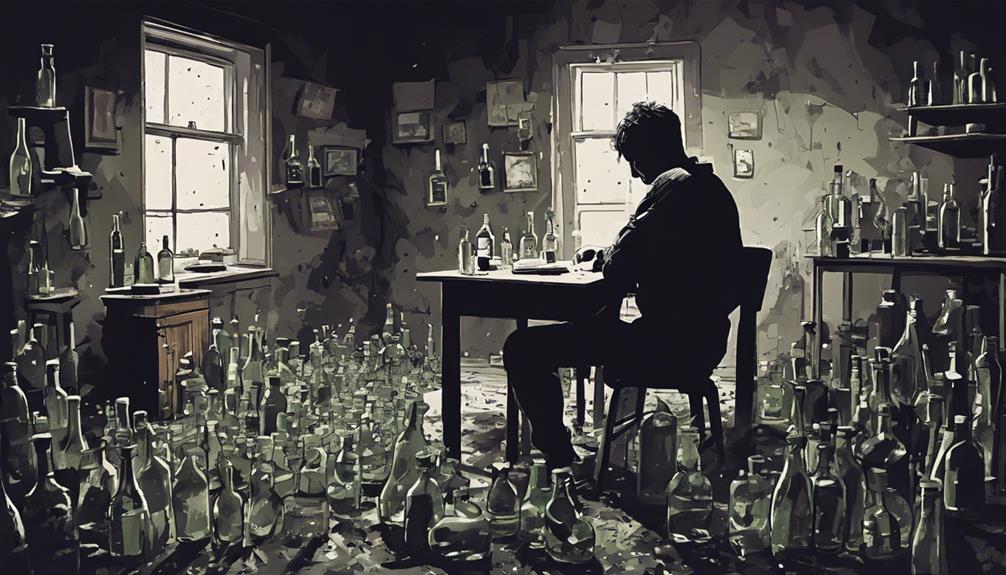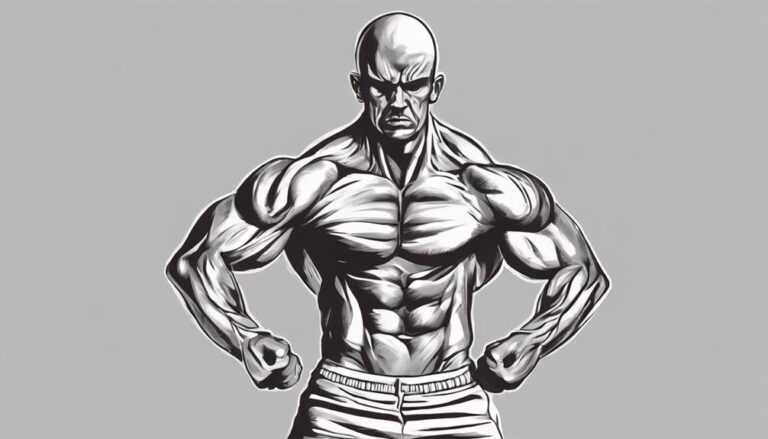What Are the Signs of Depression in Men, and How Is It Treated?
Have you ever wondered if the subtle changes in behavior you've noticed in someone close to you could be more than just a passing phase?
Understanding the signs of depression in men is crucial, as they often manifest differently than in women. From societal expectations to biological factors, men face unique challenges in acknowledging and seeking help for mental health issues.
But what are the specific signs to look out for, and how can depression be effectively treated in men? Let's explore the nuances of this important topic together.
Key Takeaways
- Depression in men presents unique challenges and symptoms, including persistent sadness and irritability.
- Overcoming stigma and societal expectations is crucial for diagnosing and treating depression in men.
- Depression impacts relationships and work performance, emphasizing the need for coping mechanisms and professional help.
- Treatment options include therapy, medication, lifestyle changes, and alternative therapies for a holistic approach.
Overview of Depression in Men
Depression in men often manifests differently than in women, with unique challenges and symptoms. Society's expectations of men, such as the pressure to appear strong and resilient, can contribute to underreporting of mental health issues. Mental health awareness plays a crucial role in recognizing and addressing these challenges. Men may struggle with expressing their emotions openly due to societal norms that discourage vulnerability. This can lead to bottling up feelings, exacerbating depressive symptoms.
Coping mechanisms for men facing depression are essential for managing the condition. Encouraging emotional expression through safe spaces, therapy, or support groups can aid in processing feelings and reducing the stigma around seeking help. It's important for men to understand that seeking support isn't a sign of weakness but a proactive step towards better mental health. By fostering an environment that promotes open dialogue and destigmatizes mental health struggles, men can feel more empowered to address their emotional well-being.
Common Signs and Symptoms
Navigating through depression can be challenging, especially when the signs and symptoms aren't easily recognizable. In men, common signs of depression may include persistent feelings of sadness, hopelessness, or irritability. You might find yourself losing interest in activities you once enjoyed, experiencing changes in appetite or weight, and having trouble sleeping or sleeping too much. Fatigue, difficulty concentrating, and thoughts of death or suicide can also be prevalent symptoms.
Early intervention is crucial when dealing with depression. Reach out to your support systems, whether that's friends, family, or a mental health professional. Coping mechanisms and self-care play a vital role in managing depression. Engage in activities that bring you joy, practice relaxation techniques, and ensure you're getting enough exercise and rest. Remember, it's okay to seek help and prioritize your mental well-being.
Unique Challenges in Diagnosis
Recognizing depression in men can be complex due to societal expectations that discourage emotional vulnerability. Overcoming the stigma surrounding mental health can be a significant barrier for men seeking help.
It's important to address diagnostic biases and promote open conversations to ensure accurate identification and treatment of depression in men.
Diagnostic Biases in Men
One common challenge in diagnosing depression in men is the tendency to overlook subtle emotional cues that may indicate underlying mental health issues. When it comes to men's mental health, diagnostic biases can hinder the identification and treatment of depression.
- Social Expectations: Traditional gender stereotypes often pressure men to appear strong and stoic, leading to the masking of depressive symptoms.
- Communication Barriers: Men may find it challenging to express their emotions openly, making it harder for healthcare providers to assess their mental well-being.
- Misinterpretation of Behaviors: Certain signs of depression in men, such as irritability or anger, may be misconstrued or overlooked.
- Reluctance to Seek Help: Due to societal norms, men might be less likely to seek professional assistance for mental health concerns.
- Underreporting of Symptoms: Men may downplay their feelings or symptoms, making it harder to recognize the presence of depression.
Overcoming Stigma Barriers
To effectively address the unique challenges in diagnosing depression in men, it is crucial to confront and dismantle the stigma barriers that often prevent accurate identification and treatment of mental health issues. Mental health awareness and cultural beliefs play a significant role in shaping how men perceive seeking help for mental health concerns. Support systems and societal expectations can also impact how men express their emotions and navigate through mental health challenges. Breaking down these barriers requires a collective effort to normalize discussions around mental health and encourage men to prioritize their well-being. By fostering an environment that promotes open communication and destigmatizes seeking help, more men can feel empowered to address their mental health needs effectively.
| Point of Emphasis | Key Factors |
|---|---|
| Mental Health Awareness | Cultural Beliefs |
| Support Systems | Societal Expectations |
Impact on Relationships and Work
When depression affects men, it can strain their relationships, causing difficulties in communication and understanding between partners. Additionally, work performance may be significantly impacted, leading to challenges in meeting deadlines and fulfilling responsibilities.
Navigating these relationship and work-related issues while battling depression can be overwhelming, but seeking support and treatment can help in managing these struggles effectively.
Relationship Strain Due to Depression
Depression can significantly strain relationships and impact work performance, creating challenges that need to be addressed with understanding and support.
When facing relationship strain due to depression, it's essential to consider the following:
- Relationship Dynamics: Depression can alter the dynamics within a relationship, affecting communication and intimacy.
- Coping Mechanisms: Developing healthy coping mechanisms, such as therapy or support groups, can help navigate challenges.
- Support Systems: Building a strong support system of friends, family, or professionals is crucial during difficult times.
- Communication Strategies: Open and honest communication about feelings and needs can foster understanding and connection.
- Seeking Help: Encouraging seeking professional help can provide additional tools and support to manage depression's impact on relationships.
Work Performance Affected
Struggling with maintaining optimal work performance due to the impact of depression on your relationships can be a challenging and distressing experience. Depression can affect your ability to concentrate, make decisions, and complete tasks efficiently. This might lead to decreased productivity, missed deadlines, and strained relationships with colleagues.
Seeking workplace accommodations such as flexible hours, reduced workload, or access to mental health resources can help you manage your symptoms and improve your performance. Performance evaluations can also be affected, potentially impacting your career advancement. In some cases, remote work accommodations could provide a supportive environment.
Communication Challenges at Work
Navigating communication challenges at work can significantly impact your relationships with colleagues and overall job performance. When facing difficulties in this area, remember the importance of seeking workplace support and utilizing effective communication strategies.
Here are some key points to consider:
- Seeking Support: Don't hesitate to reach out to HR or your supervisor for guidance and assistance.
- Active Listening: Practice active listening to ensure you understand your colleagues' perspectives accurately.
- Clarifying Expectations: Clearly communicate your expectations and ask for clarification when needed.
- Constructive Feedback: Offer constructive feedback in a professional and respectful manner.
- Conflict Resolution: Develop strategies for resolving conflicts peacefully and productively.
Treatment Options and Therapies
Exploring various treatment options and therapies can be key in effectively managing and overcoming the challenges of depression in men. Finding the right approach that suits your individual needs is crucial. Consider alternative therapies such as art therapy or acupuncture, which can provide a different perspective and aid in expressing emotions. Counseling options, including one-on-one therapy or group therapy, offer a safe space to discuss feelings and develop coping strategies. Holistic approaches, like yoga or meditation, can help promote overall well-being and reduce stress levels. Mindfulness techniques, such as deep breathing exercises or journaling, can assist in staying present and managing negative thoughts. Below is a table outlining some common treatment options and therapies for depression in men:
| Treatment Options | Description |
|---|---|
| Alternative Therapies | Art therapy, acupuncture |
| Counseling Options | One-on-one therapy, group therapy |
| Holistic Approaches | Yoga, meditation |
| Mindfulness Techniques | Deep breathing exercises, journaling |
Role of Medication in Treatment
Considering the efficacy and potential side effects, medication plays a significant role in the comprehensive treatment plan for depression in men. It's crucial to understand how medication can help alleviate symptoms and improve overall well-being. Here are some key points to consider:
- Medication Effectiveness: Antidepressants can be highly effective in managing depressive symptoms and restoring balance to brain chemicals that regulate mood.
- Side Effects: While medications can be beneficial, they may also come with side effects such as nausea, weight gain, or sexual dysfunction. It's important to discuss these with your healthcare provider.
- Alternative Therapies: In addition to medication, alternative therapies like cognitive-behavioral therapy (CBT) or mindfulness practices can complement treatment and provide additional support.
- Holistic Approach: A holistic approach that combines medication with lifestyle changes, therapy, and social support can lead to more comprehensive and long-lasting benefits.
Importance of Lifestyle Changes
Making meaningful changes to your daily habits and routines can significantly impact your mental well-being and help in managing depression effectively. Engaging in wellness activities such as regular exercise, mindfulness practices, and hobbies that bring you joy can play a crucial role in alleviating symptoms of depression.
Physical activity, even in small doses, can boost your mood by releasing endorphins and reducing feelings of stress and anxiety. Incorporating behavior changes like maintaining a healthy diet, ensuring proper sleep hygiene, and practicing relaxation techniques can also contribute to improving your overall mental health.
Furthermore, establishing a routine that includes time for self-care and relaxation is essential. Prioritizing activities that promote relaxation, such as meditation, deep breathing exercises, or spending time in nature, can help in managing stress levels and fostering a sense of calm.
Seeking Help and Support
To effectively manage depression, seeking help and support from professionals and loved ones is crucial in navigating your journey towards improved mental well-being. It's essential to remember that you don't have to go through this alone. Here are some steps you can take to seek the help you need:
- Support Groups: Joining a support group can provide you with a sense of community, where you can share your experiences and learn from others going through similar challenges.
- Counseling: Seeking counseling from a mental health professional can offer you a safe space to explore your feelings and develop coping strategies tailored to your needs.
- Mental Health Resources: Take advantage of mental health resources available in your community or online to access valuable information and tools to support your mental well-being.
- Therapy: Engaging in therapy sessions with a trained therapist can help you address underlying issues contributing to your depression and develop effective ways to manage your symptoms.
- Family and Friends: Lean on your loved ones for emotional support and understanding. Opening up to them can strengthen your relationships and provide you with a strong support system during difficult times.
Conclusion
In conclusion, recognizing the signs of depression in men is crucial for seeking help and support. Just like a dark cloud hovering over a sunny day, depression can cast a shadow on your life. But with the right treatment and therapies, you can find relief and start to feel like yourself again.
Remember, you aren't alone in this journey, and reaching out for help is a sign of strength, not weakness. Take care of yourself and prioritize your mental health.







